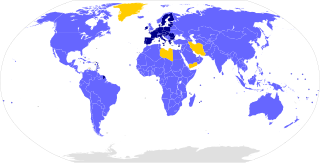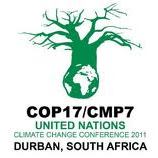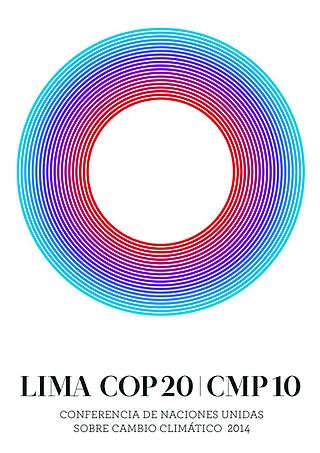
The Kyoto Protocol (Japanese: 京都議定書, Hepburn: Kyōto Giteisho) was an international treaty which extended the 1992 United Nations Framework Convention on Climate Change (UNFCCC) that commits state parties to reduce greenhouse gas emissions, based on the scientific consensus that global warming is occurring and that human-made CO2 emissions are driving it. The Kyoto Protocol was adopted in Kyoto, Japan, on 11 December 1997 and entered into force on 16 February 2005. There were 192 parties (Canada withdrew from the protocol, effective December 2012) to the Protocol in 2020.

The United Nations Framework Convention on Climate Change (UNFCCC) is the UN process for negotiating an agreement to limit dangerous climate change. It is an international treaty among countries to combat "dangerous human interference with the climate system". The main way to do this is limiting the increase in greenhouse gases in the atmosphere. It was signed in 1992 by 154 states at the United Nations Conference on Environment and Development (UNCED), informally known as the Earth Summit, held in Rio de Janeiro. The treaty entered into force on 21 March 1994. "UNFCCC" is also the name of the Secretariat charged with supporting the operation of the convention, with offices on the UN Campus in Bonn, Germany.
Post-Kyoto negotiations refers to high level talks attempting to address global warming by limiting greenhouse gas emissions. Generally part of the United Nations Framework Convention on Climate Change (UNFCCC), these talks concern the period after the first "commitment period" of the Kyoto Protocol, which expired at the end of 2012. Negotiations have been mandated by the adoption of the Bali Road Map and Decision 1/CP.13.

The 2008 United Nations Climate Change Conference took place at PIF Congress Centre, Poznań International Fair (PIF), in Poznań, Poland, between December 1 and December 12, 2008. Representatives from over 180 countries attended along with observers from intergovernmental and nongovernmental organizations.

The 2010 United Nations Climate Change Conference was held in Cancún, Mexico, from 29 November to 10 December 2010. The conference is officially referred to as the 16th session of the Conference of the Parties (COP 16) to the United Nations Framework Convention on Climate Change (UNFCCC) and the 6th session of the Conference of the Parties serving as the meeting of the Parties (CMP 6) to the Kyoto Protocol. In addition, the two permanent subsidiary bodies of the UNFCCC — the Subsidiary Body for Scientific and Technological Advice (SBSTA) and the Subsidiary Body for Implementation (SBI) — held their 33rd sessions. The 2009 United Nations Climate Change Conference extended the mandates of the two temporary subsidiary bodies, the Ad Hoc Working Group on Further Commitments for Annex I Parties under the Kyoto Protocol (AWG-KP) and the Ad Hoc Working Group on Long-term Cooperative Action under the Convention (AWG-LCA), and they met as well.
In political ecology and environmental policy, climate governance is the diplomacy, mechanisms and response measures "aimed at steering social systems towards preventing, mitigating or adapting to the risks posed by climate change". A definitive interpretation is complicated by the wide range of political and social science traditions that are engaged in conceiving and analysing climate governance at different levels and across different arenas. In academia, climate governance has become the concern of geographers, anthropologists, economists and business studies scholars.
The Kyoto Protocol was an international treaty which extended the 1992 United Nations Framework Convention on Climate Change. A number of governments across the world took a variety of actions.
The Kyoto Protocol was an international treaty which extended the 1992 United Nations Framework Convention on Climate Change.

The Paris Agreement is an international treaty on climate change that was signed in 2016. The treaty covers climate change mitigation, adaptation, and finance. The Paris Agreement was negotiated by 196 parties at the 2015 United Nations Climate Change Conference near Paris, France. As of February 2023, 195 members of the United Nations Framework Convention on Climate Change (UNFCCC) are parties to the agreement. Of the three UNFCCC member states which have not ratified the agreement, the only major emitter is Iran. The United States withdrew from the agreement in 2020, but rejoined in 2021.

The 2011 United Nations Climate Change Conference (COP17) was held in Durban, South Africa, from 28 November to 11 December 2011 to establish a new treaty to limit carbon emissions.

The United Nations Climate Change Conference, COP19 or CMP9 was held in Warsaw, Poland from 11 to 23 November 2013. This is the 19th yearly session of the Conference of the Parties to the 1992 United Nations Framework Convention on Climate Change (UNFCCC) and the 9th session of the Meeting of the Parties to the 1997 Kyoto Protocol. The conference delegates continue the negotiations towards a global climate agreement. UNFCCC's Executive Secretary Christiana Figueres and Poland's Minister of the Environment Marcin Korolec led the negotiations.

The United Nations Climate Change Conferences are yearly conferences held in the framework of the United Nations Framework Convention on Climate Change (UNFCCC). They serve as the formal meeting of the UNFCCC parties – the Conference of the Parties (COP) – to assess progress in dealing with climate change, and beginning in the mid-1990s, to negotiate the Kyoto Protocol to establish legally binding obligations for developed countries to reduce their greenhouse gas emissions. Starting in 2005 the conferences have also served as the "Conference of the Parties Serving as the Meeting of Parties to the Kyoto Protocol" (CMP); also parties to the convention that are not parties to the protocol can participate in protocol-related meetings as observers. From 2011 to 2015 the meetings were used to negotiate the Paris Agreement as part of the Durban platform, which created a general path towards climate action. Any final text of a COP must be agreed by consensus.

The United Nations Climate Change Conference, COP20 or CMP10 was held in Lima, Peru, from December 1 to 12, 2014. This was the 20th yearly session of the Conference of the Parties to the 1992 United Nations Framework Convention on Climate Change (UNFCCC) and the 10th session of the Meeting of the Parties to the 1997 Kyoto Protocol. The conference delegates held negotiations towards a global climate agreement.

The 2015 United Nations Climate Change Conference, COP 21 or CMP 11 was held in Paris, France, from 30 November to 12 December 2015. It was the 21st yearly session of the Conference of the Parties (COP) to the 1992 United Nations Framework Convention on Climate Change (UNFCCC) and the 11th session of the Meeting of the Parties (CMP) to the 1997 Kyoto Protocol.

The nationally determined contributions (NDCs) are commitments that countries make to reduce their greenhouse gas emissions as part of climate change mitigation. These commitments include the necessary policies and measures for achieving the global targets set out in the Paris Agreement. The Paris Agreement has a long-term temperature goal which is to keep the rise in global surface temperature to well below 2 °C (3.6 °F) above pre-industrial levels. The treaty also states that preferably the limit of the increase should only be 1.5 °C (2.7 °F). To achieve this temperature goal, greenhouse gas emissions should be reduced as soon as, and by as much as, possible. To stay below 1.5 °C of global warming, emissions need to be cut by roughly 50% by 2030. This figure takes into account each country's documented pledges or NDCs.

The 2016 United Nations Climate Change Conference was an international meeting of political leaders and activists to discuss environmental issues. It was held in Marrakech, Morocco, on 7–18 November 2016. The conference incorporated the twenty-second Conference of the Parties (COP22), the twelfth meeting of the parties to the Kyoto Protocol (CMP12), and the first meeting of the parties to the Paris Agreement (CMA1). The purpose of the conference was to discuss and implement plans about combatting climate change and to "[demonstrate] to the world that the implementation of the Paris Agreement is underway". Participants work together to come up with global solutions to climate change.

A climate target, climate goal or climate pledge is a measurable long-term commitment for climate policy and energy policy with the aim of limiting the climate change. Researchers within, among others, the UN climate panel have identified probable consequences of global warming for people and nature at different levels of warming. Based on this, politicians in a large number of countries have agreed on temperature targets for warming, which is the basis for scientifically calculated carbon budgets and ways to achieve these targets. This in turn forms the basis for politically decided global and national emission targets for greenhouse gases, targets for fossil-free energy production and efficient energy use, and for the extent of planned measures for climate change mitigation and adaptation.

Sustainable Development Goal 13 is to limit and adapt to climate change. It is one of 17 Sustainable Development Goals established by the United Nations General Assembly in 2015. The official mission statement of this goal is to "Take urgent action to combat climate change and its impacts". SDG 13 and SDG 7 on clean energy are closely related and complementary.

Pledge and review is a method for facilitating international action against climate change. It involves nations each making a self-determined pledge relating to actions they expect to take in response to global warming, which they submit to the United Nations. Some time after the pledges have been submitted, there is a review process where nations assess each other's progress towards meeting the pledges. Then a further round of enhanced pledges can be made, and the process can further iterate.














